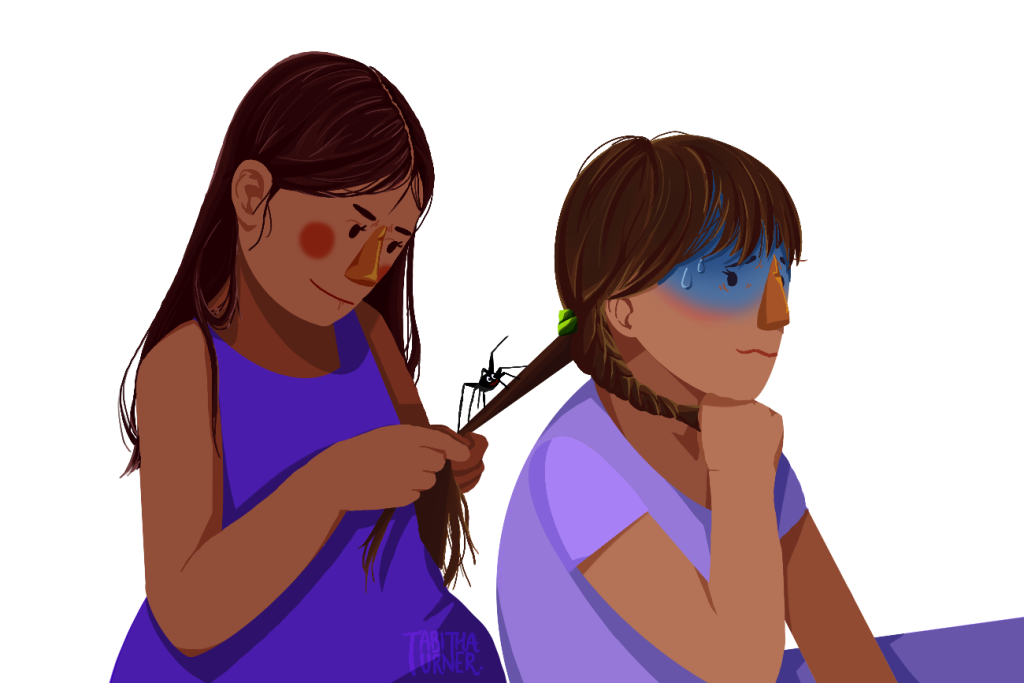
I have asked my sister to plait my hair a handful of times in the past, since she has always had this skill that I quite clearly lack. I quickly realised I would rather go without French or Dutch braids, especially if she was going to do them for me. She would pull so hard on my straight, thin strands, tug my head to the point it hurt and even hold pieces of my hair in her mouth so she could use her hands more efficiently. And yet, whilst she clearly was putting in the effort, my plaited hair would never look as good as hers. My sister’s beautiful, bouncy curls will twist together perfectly, always looking thick and healthy and will stay in place forever; her hair is everything mine isn’t. However, she will always complain about how much maintenance is required for her hair, whereas I will never have this issue. Sister jealousy works both ways, but will often take such different forms. We will always have similarities, but it’s what one has that the other does not that will always spark the most intense jealousy, and it usually comes to surface. As author Lisa See quite rightly suggests, ‘A sister is someone who should stand by you and support you and love you no matter what, and yet it’s also your sister who knows exactly where to drive the knife and hurt you the most.’.
…
Recently online there has been a rise of discussion on Phoebe Waller-Bridge’s highly acclaimed television series, Fleabag. The discussion in question has focused on the heart-wrenching beauty of the season two love story between titular characters, Fleabag (Waller-Bridge) and the Hot Priest (Andrew Scott). It’s true, the portrayal of their relationship truly is excellent, but it could be argued that the relationship between Fleabag and her sister, Claire (Sian Clifford), has the substance that leaves a longer-lasting impression. Waller-Bridge’s depiction of Fleabag and Claire’s relationship illustrates the exact principles of sisterhood, by convincingly presenting the rivalry, jealousy, forgiveness and love that comes with being a sister. In Fleabag, both sisters see the other as having the ideal life; Claire is resentful of Fleabag’s ability to escape accountability whilst Fleabag is envious of Claire’s seemingly put together life. Audiences watch them battle their differences but also find solace and nostalgia in what brings them so close together. Season two follows Claire’s initial alienation of her sister but their relationship heals over time, following miscarriages, big offices and awful haircuts. In the season finale, we watch as Claire tells Fleabag, ‘The only person I’d run through an airport for is you,’ which not only highlights the jump they make from alienation, but equally presents the show as a deviation from most western romances. We are so familiar with romantic endings that we forget about the portrayal of platonic relationships, hence why the ending of Fleabag is so important. She may not get the man but she will always have this beautiful, solidified relationship with her own sister.
Since 1868, Louisa May Alcott’s novel Little Women has taught readers about the complexities of sisterhood. Over the years there have been plenty of film and television adaptations, with the most recent film adaptation being Greta Gerwig’s 2019 take on the classic story. Audiences follow the intertwined lives of the four March sisters, Jo (Saoirse Ronan), Meg (Emma Watson), Beth (Eliza Scanlen) and Amy (Florence Pugh), who all have their contrasting differences but all value the importance of family, particularly their sibling relationships. As with Fleabag, it’s refreshing to see the depiction of pure hatred in relation to sisterhood, which is something Gerwig does very well. However, the development of Jo and Amy’s relationship proves that no matter the extent of harm and betrayal, each sister will go on to agree that ‘life is too short to be angry at one’s sister,’. This adaptation is actually a favourite of both myself and my own sister, we have watched it together so many times I am certain we could narrate the entire script between us.
Both Fleabag and Little Women follow the stories and lives of sisters who view their counterpart with a mixture of love and envy. The balance of sisterhood is fundamentally a balance of these two themes, so in order to execute the portrayal of this sibling relationship both the highs and the lows must be considered, which is what both Fleabag and Little Women do so well. However, it would be naive to assume every sibling relationship will overcome the hardest betrayals, because some things are not so easily forgivable. However, as a sister myself, I cannot imagine not having that closeness. Being a sister is such a different experience to being a friend or even just a family member, it is a closeness that is defined by a constant incongruity of emotion. A sister knows more about you than anyone else, and this could either work in your favour or against.
Illustration Credit: Tabitha Turner
